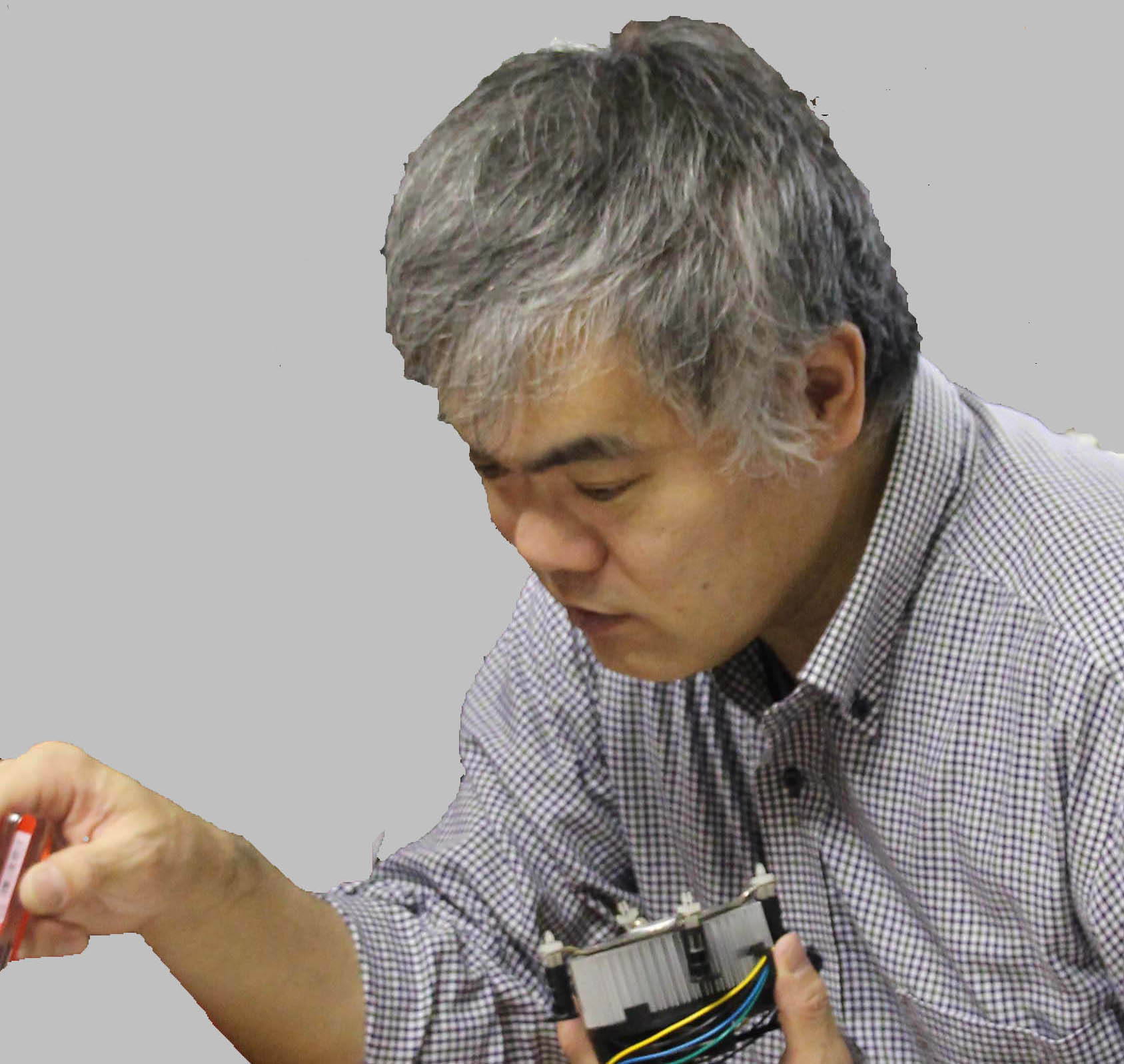
MORI Kazuyoshi
Professor
- Affiliation
- Department of Computer Science and Engineering/Division of Computer Science
- Title
- Professor
- k-mori@u-aizu.ac.jp
- Web site
- http://www.u-aizu.ac.jp/~k-mori
Education
- Courses - Undergraduate
- Discrete System Theory, Linear System Theory, Automata and Formal Languages, Mathematics Teaching Methods 1, Do it logically(SCCP)
- Courses - Graduate
- Formal Specification of Processing
Research
- Specialization
-
Computational science
Linear System Theory, its Applications, Symbolic Logic, Theory of Computing, Educational Systems(Logically based), CM Collector
- Educational Background, Biography
-
Education
April 1981 - March 1986 Department Electrical Engineering, Gunma Technical College, Gunma
April 1986 - March 1988 Department of Information and Computer Sciences, Toyohashi University of Technology, Aichi (March 1988, Bachelor of Engineering)
April 1988 - March 1990 Department of Information and Computer Sciences, Toyohashi University of Technology, Aichi (March 1990, Master of Engineering)
April 1990 - March 1993 Systems and Information Engineering, Toyohashi University of Technology, Aichi (Decembe 1993, Doctor of Engineering)
Research and Teaching Experiences
December 1993 - April 2000 Assistant Professor Tohoku University, Sendai
September 1998 - June 1999 Researcher Institut de Recherche en Cybernetique de Nantes, Nantes, France (by the fellowship of the Ministry of Education of Japan)
May 2000 - March 2004 Assistant Professor The University of Aizu, Aizu-Wakamatsu
April 2004 - March 2013 Associate Professor The University of Aizu, Aizu-Wakamatsu
April 2012 - Present Professor The University of Aizu, Aizu-Wakamatsu
- Current Research Theme
- Two-Stage Stabilization Theory, Education System for Linear Systems, Automatic Categorization of Images and Animations, Linear System Theory without Doubly Coprime Factorization, Logically Educational System, CM Collector
- Key Topic
- Linear Systems, Parametrization of Stabilizing Controllers, Factorization Approach, Educational Systems
- Affiliated Academic Society
- IEEE(Institute of Electrical and Electronics Engineers), SIAM(Society for Industrial and Applied Mathematics), JSIAM(The Japan Society for Industrial and Applied Mathematics), IPSJ(Information Processing Society of Japan), SICE(The Society of Instrument and Control Engineers), JSSAC(Japan Society for Symbolic and Algebraic Computation), ISCIE(The Institute of Systems, Control and Information Engineers).
Others
- Hobbies
- Life with family
- School days' Dream
- Electricity (such as miniature bulb and electromagnet)
->Electronic circuits (such as transistor radios)
->Computer (Fortran 77 by punch cards and then by TSS)
->Symbol Computation (Lisp programing and implementation of LISP systems)
->Computing Theory (Lambda-Calculus, Combinators, Turing Numbers)
->Computer Algebra Systems (Combination of symbolic and numeric computations)
->Control System Theory with Factorization Approach
- Current Dream
- To develop the synthesis linear control toehry.
To determine the minimal number of parameters to archive the prametrization of stabilizing controlers for many linear system models.
To develop educational systems for discrete mathamatics,
linear system theory LOGICALLY on computers, pads, smartphones and so on.
To develop a system to collect CMs.
- Favorite Books
- Longman Language Activator
Anne of Green Gables(Lucy Maud Montgomery)
The Prince (Niccolò Machiavelli)
Deciphering Sun Tzu: How to Read the Art of War (Derek M. C. Yuen)
- Messages for Students
- (For international students)
If you want to study with me for Master Degree and/or
Doctoral Degree, please contact me.
Main research
- Parametrization of Stabilizing Controllers
-
This study is to obtain all stabilizing controllers of a linear system by a parameter. Once we can know all of the stabilizing controllers of the system, we can consider, based on the this parametrization, optimization, sensitive minimization, model matching, and so on. So far, we have developed the theory to calculate the parametrization of stabilizing controllers without coprime factorization and the theory to calculate the parametrization of stabilizing controllers that have a formulated delay pattern. The approach we use is he factorization approach, systems has the advantage that it embraces, within a single framework, numerous linear systems such as continuous-time as well as discrete-time systems, lumped as well as distributed systems, one-dimensional as well as multidimensional systems, etc.
Dissertation and Published Works
1. K.MORI, Parameterisation of stabilising controllers with precompensators, IET Control Theory and Applications, 6(2), pp.297-304, 2012.
2. K.MORI, Parametrization of All Strictly Causal Stabilizing Controllers, IEEE Transactions on Automatic Control,
54(9), pp.2211-2215, 2009.
3. K.MORI, Reduction of Parameters for Stabilizing Controllers without Coprime Factorizability, IMA Journal of Mathematical Control and Information, Oxford University Press, 25(4), pp.432-446, 2008.
4. K.MORI, Elementary proof of controller parametrization without coprime factorizability. IEEE Transactions on Automatic Control, 49(4), pp.589-592, 2004.
5. K.MORI, Relationship between Standard Control Problem and Model-Matching Problem without Coprime Factorizability IEEE Transactions on Automatic Control, 49(2), pp.230-233, 2004.
6. K.MORI, Controller Parameterization of Anantharam's Example, IEEE Transactions on Automatic Control, 48(9), pp.1655-1656, 2003.
7. K.MORI, Parameterization of Stabilizing Controllers with either Right- or Left-Coprime Factorization, IEEE Transactions on Automatic Control, 47(10), pp.1763-1767, 2002
8. K.MORI, New Algorithm to Construct a Stabilizing Controller for Linear Systems over Integral, IMA Journal of Mathematical Control and Information, Oxford University Press, 19(3), pp.325-352, 2002.
9. K.MORI, Parameterization of Stabilizing Controllers over Commutative Ring with Application to Multidimensional Systems, IEEE Transactions on Circuits and Systems ? I, (45)6, pp.743-752, 2002.
10. K.MORI, K. ABE, Feedback Stabilization over Commutative Rings: Further Study of Coordinate-Free Approach, SIAM Journal on Control and Optimization, (39)6, pp.1952-1973, 2001


